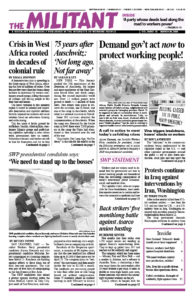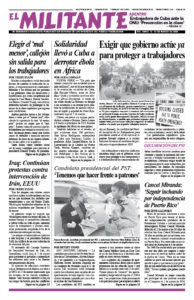Capitalist rulers the world over are leaving millions to fend for themselves in the face of the explosion of coronavirus and the social consequences — spreading layoffs, loss of a paycheck, disappearing places to get necessities and uncertainty about the future.
Their profit-driven actions stand in stark contrast to the conduct of the revolutionary government of Cuba, where workers and farmers in power have sharply counterposed values to those where the bosses rule.
In the place of travel bans and “lockdowns in place”— which isolate workers from one another — the Cuban government has mobilized working people to conquer the disease. It organizes meetings in workplaces, unions and neighborhoods to discuss the virus. Neighborhood medical personnel are expanding checks at people’s homes. Alongside preventive measures, the government has prepared for the likely spread of the disease for weeks, establishing special treatment facilities and quarantine centers.
There are 7.7 doctors per every 1,000 Cubans, the highest ratio of any country in the world. They are based in the neighborhoods where those they treat live, treating them with dignity and respect — as patients, not as customers.
Training sessions in schools to prevent the spread of the disease have been organized for teachers and other workers, side by side with the students. This preparation includes medical workers based in the schools and collaboration with parents.
The character of health care in Cuba is not a product of a benevolent government bestowing much-needed rights, like health care, on working people, but of a government formed by working people.
Led by Fidel Castro, workers and farmers built a revolutionary movement that overthrew the U.S.-backed dictator Fulgencio Batista in 1959. They went on to establish their own government, and used their power to nationalize the factories, banks and the land.
During the revolutionary war the Rebel Army organized working people to take charge of the organization of health care — as well as education, justice and land reform — as they were fighting the Batista regime. Clinics and field hospitals were set up, treating not only Rebel Army members, but also wounded soldiers from Batista’s forces and local residents — many receiving health care for the first time in their lives.
Working people were changed through these struggles, becoming capable of doing things they had always been “taught” were impossible, including defending their conquests from Washington’s six-decades-long drive to overturn their socialist revolution.
Cuba has 28,268 workers on volunteer medical brigades in 61 countries. They treat people in remote rural areas and working-class neighborhoods that for-profit health care providers stay away from.
Far from scaling back international solidarity, the Cuban government has agreed to requests from other countries to send them doctors and nurses to treat those with coronavirus. The health minister of Lombardy, the region in Italy with the highest rate of infection, reports that Cuban medical personnel are on the way.
Some 400 medical volunteers from the Henry Reeve International Brigade have been given special training for missions abroad.
After the British cruise ship MS Braemar — with a small number of people infected with coronavirus — was turned away by authorities in Bermuda, the Bahamas and the Dominican Republic, the Cuban government allowed the ship to dock. Cuban authorities will provide medical checks for passengers and treat those who need it before they fly home. Passenger Anthea Guthrie tweeted, “We will never forget that Cuba answered us when absolutely no one else would.”
Opponents of the revolution in the U.S., like Miami-Dade County Commissioner Esteban Bovo, are seeking to intensify the U.S. economic war on Cuba’s revolutionary government by urging Washington to cancel all flights to and from Cuba, alleging Cuba is “ill-prepared” for the epidemic.
This is a bald-faced lie. Workers in the U.S. and elsewhere will, through their own class-struggle experiences, learn they can emulate the Cuban Revolution.

